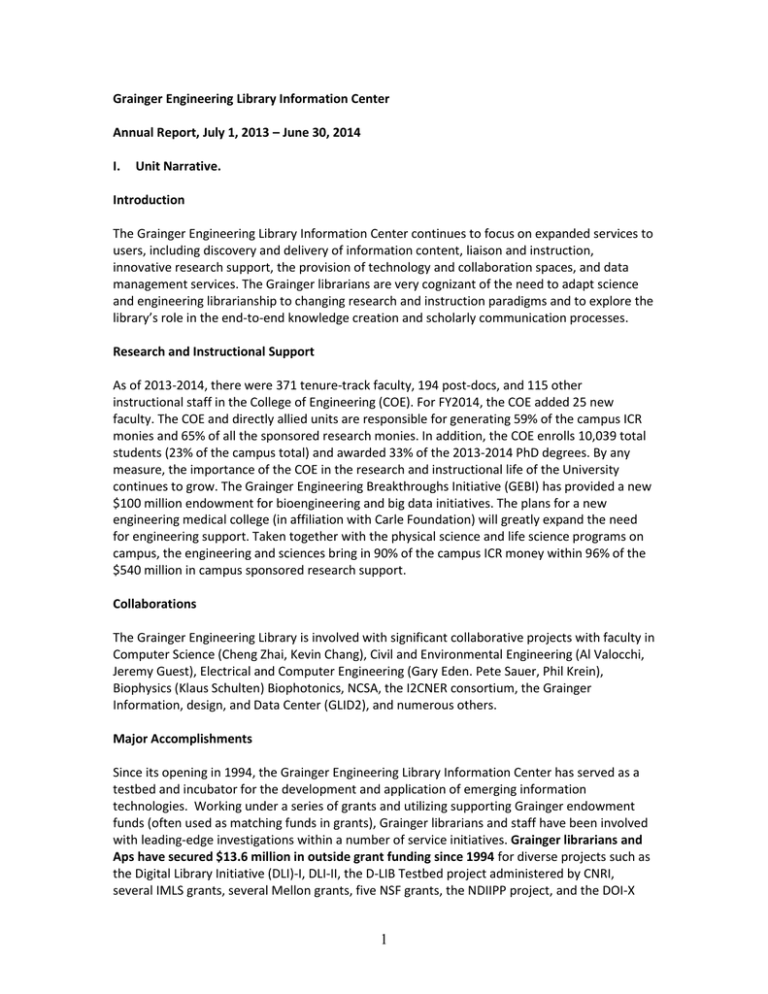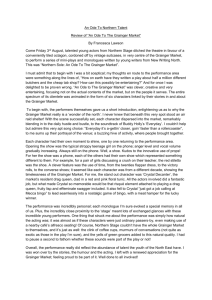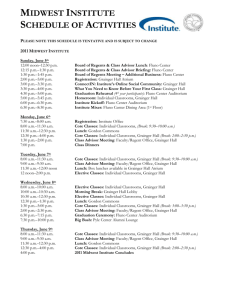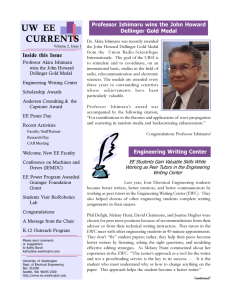Grainger Engineering Library Information Center I. Unit Narrative.
advertisement

Grainger Engineering Library Information Center Annual Report, July 1, 2013 – June 30, 2014 I. Unit Narrative. Introduction The Grainger Engineering Library Information Center continues to focus on expanded services to users, including discovery and delivery of information content, liaison and instruction, innovative research support, the provision of technology and collaboration spaces, and data management services. The Grainger librarians are very cognizant of the need to adapt science and engineering librarianship to changing research and instruction paradigms and to explore the library’s role in the end-to-end knowledge creation and scholarly communication processes. Research and Instructional Support As of 2013-2014, there were 371 tenure-track faculty, 194 post-docs, and 115 other instructional staff in the College of Engineering (COE). For FY2014, the COE added 25 new faculty. The COE and directly allied units are responsible for generating 59% of the campus ICR monies and 65% of all the sponsored research monies. In addition, the COE enrolls 10,039 total students (23% of the campus total) and awarded 33% of the 2013-2014 PhD degrees. By any measure, the importance of the COE in the research and instructional life of the University continues to grow. The Grainger Engineering Breakthroughs Initiative (GEBI) has provided a new $100 million endowment for bioengineering and big data initiatives. The plans for a new engineering medical college (in affiliation with Carle Foundation) will greatly expand the need for engineering support. Taken together with the physical science and life science programs on campus, the engineering and sciences bring in 90% of the campus ICR money within 96% of the $540 million in campus sponsored research support. Collaborations The Grainger Engineering Library is involved with significant collaborative projects with faculty in Computer Science (Cheng Zhai, Kevin Chang), Civil and Environmental Engineering (Al Valocchi, Jeremy Guest), Electrical and Computer Engineering (Gary Eden. Pete Sauer, Phil Krein), Biophysics (Klaus Schulten) Biophotonics, NCSA, the I2CNER consortium, the Grainger Information, design, and Data Center (GLID2), and numerous others. Major Accomplishments Since its opening in 1994, the Grainger Engineering Library Information Center has served as a testbed and incubator for the development and application of emerging information technologies. Working under a series of grants and utilizing supporting Grainger endowment funds (often used as matching funds in grants), Grainger librarians and staff have been involved with leading-edge investigations within a number of service initiatives. Grainger librarians and Aps have secured $13.6 million in outside grant funding since 1994 for diverse projects such as the Digital Library Initiative (DLI)-I, DLI-II, the D-LIB Testbed project administered by CNRI, several IMLS grants, several Mellon grants, five NSF grants, the NDIIPP project, and the DOI-X 1 project. In addition, the Grainger Library has developed Library-wide applications such as the Easy Search federated search suite, the Journal and Article Locator module, the Primo custom tile application, and the Citing References Search service. Grainger faculty and researchers have published 39 peer-reviewed articles/conference papers and books since 1994. In addition, the Grainger Library has continued work on the GRIPTS (Group Information Productivity Tools) e-scholarship support service tools for faculty groups. GRIPTs now include author linking, pre-determined Google News matches, author H-index links, and pre-stored key search terms which display ES results, a citing references search, and a self-contained version of Journal and Article Locator. Developed a multi-group version. Implemented for several Physics groups, Geology department, a Biophotonics group, a Biophysics group, Mechanical Engineering and Sciences department, Nuclear Science and Engineering, the Electrical and Computer Engineering department, and the Civil and Environmental Engineering department. GRIPTS are also being developed for Chemistry, several biology departments, and other departments. With Kyushu University we developed a multi-university GRIPT for the I2CNER (International Institute for Carbon Neutral Energy Research). See: http://hades.grainger.uiuc.edu/guy/pip72014.asp?i2cner http://hades.grainger.uiuc.edu/guy/gatest.asp?ece These projects involve innovative discovery, full-text content delivery, federated Search, and research and instructional support services. Work has also begun on the Grainger Library Information, Design, and Data (GLID2) Center, which will serve as a prototype collaboration space and incubator environment for students and faculty to utilize advanced informatics, visualization, and data analysis tools in the creation and application of new knowledge. Located on the lower level west and center areas and the second floor east area of the Grainger Engineering Library, the goal of the GLID2 is to facilitate faculty/student entrepreneurial activities and to fuel innovations in next-gen design and data analysis. The GLID2 will provide spaces and technologies to enable faculty and students to collaborate in the exploration of the interface between design, informatics, visualization, and big data. Several Grainger librarians made site visits in May 2014 to the NCSU Hunt Library, Duke University Library, and the University of Michigan Duderstadt Center. Grainger librarians also corresponded with library staff at Brown University, the University of Calgary, The Ohio State University, and the University of Nevada Las Vegas regarding visualization projects. For the GLID2, at this point, we have cleared the lower level center, lower level west, and second floor west areas by shifting 72,000 volumes to Oak Street. We are also preparing a white paper on Reimagineering the Grainger Engineering Library Information Center for presentation to potential donors and grant agencies. Modified custom DMP (Data Management Plan) Template for the NSF requirement of a DMP for all grants. With assistance of OSPRA and in conjunction with campus-wide Data Stewardship Committee and Research Support Services initiative, monitored usage of our Template and analyzed NSF DMPs through UIUC grants submitted through Fastlane (NSF). Currently analyzed 1260 proposals; the Grainger template has been used on 215 NSF proposals, including 45 funded grants 2 The Head of the Grainger Engineering Library helped prepare the proposal and strategic plan that resulted in the campuswide Research Data Service. He also chaired the search for Director of RDS. Grainger librarians made presentations to all incoming graduate students in Materials Science, Mechanical Science and Engineering, Industrial and Enterprise Systems Engineering, Electrical and Computer Engineering, Computer Science, and Civil and Environmental Engineering – approximately 750 students. We also made presentations to several research methods classes Civil and Environmental Engineering, Computer Science, and Mechanical Science and Engineering. All told, since 08/2013 Grainger librarians made 43 presentations to approximately 1431 attendees since July 15, 2013. Grainger GAs also taught 8 research support seminars as part of the CARE program. Managed collection budget of $1.9 million. Purchased Elsevier, IEEE, ASCE, and Taylor and Francis backfiles, 7th edition of the Morgan and Claypool Synthesis files. Analyzed the CARE (Center for Academic Resources in Engineering) center services aimed at improving student retention and providing enhanced collaboration spaces and tutoring services on Grainger 4th Floor. Implemented a library information literacy program in CARE. Includes remodeling projects on the 4th floor; installation of glass wall-boards, CITES project for AV projection on Grainger 4 West, and large-screen monitors for group studies. Worked closely with the COE administration and the Library AUL for Collections on withdrawal/transferring of collection materials for the CARE project on the 4th floor of the Grainger Library. Grainger librarians and staff presented on the CARE project in June 2014 at the annual meeting of the American Society for Engineering Education. The paper was published in the conference proceedings. Planned and installed videoconferencing equipment in Grainger 1st Floor conference room and began to investigate a planned Lower Level video conferencing room. Worked with I2CNER (International Institute for Carbon Neutral Energy Research). This is a U.S.—Japanese cooperative initiative involving the University of Illinois and Kyushu University in Japan. Also involved are the Japanese World Premier International Research Center Initiative (WPI), the U.S. Department of Energy, and the Japan Ministry for Education, Culture, Sports, Science and Technology. Visited Kyushu University to discuss areas of collaboration between the two university libraries. Also entertained a delegation of Japanese visitors, including the President of Kyushu University, to discuss the areas of collaboration. Continued work National Science Foundation grant for development and deployment of the NSF funded National Ethics Portal (the Ethics CORE Digital Library) and National Center for Professional and Research Ethics. This grant has been extended through a contract with the National technical University in Singapore which is funded a 50% academic hourly staff member. Worked on transfer of Grainger computing server infrastructure to the DCL server center. Moved the Easy Search server to DCL and deployed the new ES production version in May 2014. 3 Worked with COE on banner placement and new names placed in Grainger lobby for the third class of Engineering Hall of Fame members. With Library Development Office, continued work on Bitzer Endowment for Emerging Information Technologies, including meeting with Donald and Maryann Bitzer during induction of new members of College of Engineering Hall of Fame members. Worked on installation of working Plato terminals hands-on exhibit in the Grainger Library Continued to teach two semester GSLIS 592 independent study for Grainger GAs, focusing on methods for database access in a Web environment and metasearch and linking technologies. Participated in the College of Engineering ABET accreditation process in October 2013. Prepared report on the Grainger Engineering Library and was interviewed by individuals from the ABET team. Working with NCSA on National Data Service (NDS) activities, including preparation of NSF DIBBS proposal. Working with NCSA on the Materials Data Facility (MDF) which is a project within the Materials Genome Initiative. Worked with Silchar University, India, on information technology transfer and prepared for upcoming visit. Redesigned Grainger top-level web page to provide a portal to engineering materials. It is designed around identified user information seeking needs and methods and utilizes a portletbased approach. See: http://search.grainger.uiuc.edu/top/. The Grainger Portal also contains a custom conference finder search system which utilizes metasearch capabilities that mimic the search behavior of an expert reference librarian. This system performs four different searches of the Online Catalog (conference name, author, keyword, keyword limited to serial) and a search of the EI Village database (over Compendex and INSPEC) to try to identify conference proceeding holdings and information. Digitized Coordinated Science Laboratory (CSL) reports for IDEALS. With support from IEEE, began digitizing Power Engineering Society records and photographs. Finished spending out a Student IT fee award of $65K for the CARE (Center for Academic Resources in Engineering), computer and presentation equipment and furnishings. Major Challenges With the growing COE research, data, and instructional activities, there is a need for additional library support. Although we have added a Research and Data Services Librarian and part of the time of the Biosciences Librarian, we are still significantly down in terms of numbers of librarians from the historic high of 5 just a few years ago. Increased support is needed for Bioengineering and computational science. Collection inflation remains as a former and future threat. 4 Development and fund raising efforts need to be increased. The GLID2 services and technologies need to be planned and deployed. Funding needs to be secured. Changes Barbara Bolser left to take a position as a librarian in New Mexico and Mary Schlembach became Chemistry and Physical Sciences Librarian. Sharon McFarland retired. Megan Mahoney, who was the Ethics CORE Librarian, is now a Visiting Public Services Librarian in Grainger. Christie Wiley joined as Research and Data Services Librarian. Contributions to library-wide programs. The Easy Search, Journal and Article Locator, and (for a time) the Primo custom tile systems are used library-wide by patrons in all subject disciplines. A number of other software systems, such as the OAI-PMH harvesting programs are being used in CAM and in DCC for a variety of purposes. Grainger librarians are involved in the depositing materials and metadata into the IDEALS Institutional Repository. Grainger librarians are involved in the Research Data Services and the EZID DOI work. And Grainger facilities continue to be utilized by the Library, COE, and the campus administration for meetings and workshops. The building itself is heavily used by the entire student population. There have been peak times with 1,500 simultaneous wireless connections in the building. Goals for the Coming Year Continue fund raising activities and the work toward an endowed chair for the Head of the Grainger Library. Develop the GLID2 plans and begin implementation of the Center. Approach potential corporate sponsors and donors. Continue work on CARE and additional undergraduate support initiatives involving both the COE and the Library. Develop a closer working relationship with the GEBI (Grainger Engineering Breakthrough Initiative) Big Data program, including working closely with a COE data research specialist. Institute a Bioinformation Services Group comprised of various faculty in the Library. Continue to foster data management and knowledge creation support initiatives with the COE and allied faculty. 5 Continue to enhance and expand Easy Search, in particular the bento-box version of Easy Search and other portal and search technologies. Better integrate engineering, life science, and physical science collection decisions and collection development. Graduate Assistants Grainger Library graduate assistants engage in a variety of pre-professional activities, including collection development, reference, instruction, library duty officer and supervision, special projects (including DMP analysis), information system design and implementation, liaison assignments, and grant-funded activities. There were 9 GAs in FY14, including 3.25 on Library funds and 1.75 GAs on Grainger endowment and grant funds. All GAs work at the reference desk and participate in chat reference. In the summer semesters Grainger Gas and librarians do all the evening chat reference sessions. GA assignments: Rachelle Ramer (took position at Vassar College) Aleshia Huber CARE Info lit sessions GRIPTS PBAP Referral and scheduling databases, updates as needed Megan O’Donnell took position at Iowa State University). Julia Cater DMP analysis Web page redesigns Jenny Wong-Welch (took position at San Diego State University) Andrew James Stephens Facebook/Twitter for Grainger Digital signage Grainger Webpage FAQ + Handbooks CARE Info Lit Sessions Jason Harvey Ethics CORE most cited/disciplines pages Should also be working on editing metadata in splithtml, adding new XTF records for Ethics CORE, and GRIPTS, but these are not on her projects page in the wiki Emily Purcell Updating Blue Book content Editing splithtml for Ethics CORE Pawel Szponar (left) Creating data capture page for Physics Alumni to grant permission for dissertations/theses to be open access Meng Tao Editing splithtml for Ethics CORE Digital signage 6 Evaluating/weeding reference collection Michael Flierl (took position at Purdue University) CARE Info lit sessions Writing Two-Minute Challenges for Tina/Ethics CORE Scientific Integrity Statements analysis/chart for Ethics CORE Grainger Facebook/Twitter Facilities Total user seating: 1486 (with all conference rooms full); At tables: 707; At carrels: 464; At public workstation or index tables: 202; In group study rooms included in tables; Informal: 113. Hours Open: Fall: 24/5: Sunday – Friday, Saturday 10 AM- 10 PM. Spring: 24/5: Sunday – Friday, Saturday 10 AM- 10 PM. Finals Weeks: 24/7. Summer I and Summer II: 8:30 – Midnight; Monday – Thursday; 8:30 – 6 Friday; Saturday and Sunday 1 PM – 8 PM. Other Summer Hours: 8:30 – 5. Personnel Faculty: William Mischo Mary Schlembach (until June 2013, but maintains Physics and Geology collections at Grainger and coordinates PSED reference work) Christie Wiley (May 2013 -) Kelli Trei (July 2013 -) Megan Mahoney (was grant funded until July 2013, now visiting in Grainger) Staff: Elisandro Cabada Sharon McFarland (retired August 2014) Lyn Petrie Joshua Hollingsead Jamie Hansen (began October 2012) Sheila McGowan Ann Silcox Dmitri Tartakovsky Academic Professionals: Nikki Wright (on disability) Robert Ferrer (IT) Tom Habing (IT) 7 Jay Heldreth (IT) Graduate Assistants: Paid on Grainger Library fund (we are allocated 3.25 FTE): 50% Julia Cater (1st year) 50% Andrew James Stephens (1st year) 50% Aleshia Huber (1st year) 50% Jason Harvey (1st year) 50% Emily Purcell (1st year) 50% Meng Tao (2nd year) 50% Jamie Wittenberg (2nd year) 50% Alexandra Krogman (2nd year) Paid on Railroad Engineering Association of American Railroads Technology Funds: 50% Carly Hafner (2nd year) Student Wage Budget: Base Budget: $144,264 Additional temporary: $4,100 Summer GA: $13,785 Student Assistant FE: 43 User Services Gate Count: 1.3 million patrons (gate counts) Circulation: Charges, Renewals, Discharges 33311 21050 33970 Desk Tracker Transactions: 18,273 Presentations: 43 presentations, 1431 attendees Appendices (separate word document, graphs_grainger_13-14.docx): Gate counts, patron counts, Finals counts, sweep week counts, wireless counts. 8





